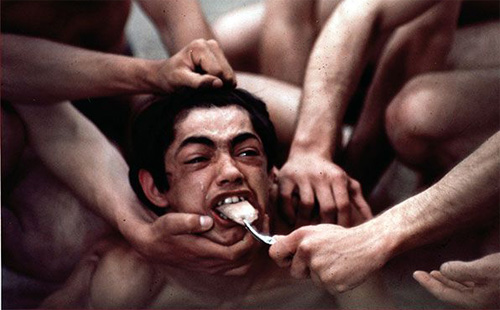When studying the Marina Abramovic controversy with Yvonne Rainer, there were several allusions to Pier Paolo Pasolini’s film Salo or The 120 Days of Sodomy. Having seen Pasolini’s “Medea” and “Oedipo Re,” I thought it would be worth watching this film that inspired Abramovic’s work. Reading a bit about it, it was described as one of the most disturbing films ever made. “This should be interesting,” I thought to myself, and proceeded to watch the film.
THIS IS ONE OF THE MOST DISTURBING FILMS I’VE EVER SEEN. It was like watching a John Waters movie without the comedy, yet overflowing with horror. Set in Italy after Musolini’s fall in 1944, four fascist leaders kidnap eighteen children and take them to a reclusive fortress. With four storytelling prostitutes, they grotesquely torture the children and their daughters mentally, sexually and absolutely sadistically. For example, the children, forced to attend a feast in the nude, are fed their own excrement. The film, which follows the structure of Dante’s Inferno and is based on the book by Marquis de Sade, opened up a whole new viewpoint for me.
Having just started Camille Paglia’s Sexual Personae: Art and Decadence from Nefertiti to Emily Dickinson, I have suddenly been influenced in thinking that maybe some sort of authoritative power is good? This wonderful social, philisophical and art critic posits that maybe humans aren’t necessarily bad, but that they are primitive, animalistic and base. She states that society serves to keep injustice in check because unregulated, humans will do awful things. Paglia specifically and explicitly takes the side of Sade, writing:
“For Sade, getting back to nature…would be to give free rein to violence and lust. I agree. Society is not criminal but the force which keeps crime in check. When social controls weaken, man’s innate cruelty bursts forth. The rapist is created not by social influences but by a failure of social conditioning.”
This is a radical opinion in my mind, but I’m not sure that I can disagree. The events that take place in Salo, although fiction, are possible. I mean…look at the Holocaust. Being “civilized” is something we’re taught. It’s what sets us apart from the rest of the animal world. And the environment in which the film takes place is controlled by no government. The horrific events occur during a time of total anarchy by no mistake. So my question is without civilization…what would we really do?
If you’re up for feeling extremely uncomfortable for learning purposes, I suggest Salo. Also, if you’re interested, there’s a wonderful documentary called Pasolini Prossimo Nostro which is all about Pasolini and his process of analyzing and making Salo. The interview takes place right before the queer director’s tragically gruesome murder (this was his last film). Buona Fortuna.

